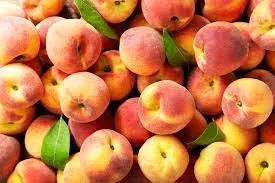Peaches are a delicious and nutritious fruit that can be enjoyed in a variety of dishes.
Nutritional content
Here is a chart outlining the nutritional content of peaches per 100 grams:
| Nutrient | Amount |
|---|---|
| Calories | 39 |
| Total Fat | 0.3 g |
| Saturated Fat | 0 g |
| Cholesterol | 0 mg |
| Sodium | 1 mg |
| Total Carbohydrates | 9.5 g |
| Dietary Fiber | 1.5 g |
| Sugar | 8.4 g |
| Protein | 1.4 g |
Peaches are a good source of vitamins and minerals, including vitamin C, vitamin A, and potassium. They also contain small amounts of other nutrients, such as iron and calcium.
Health benefits
Peaches are a delicious and nutritious fruit that are packed with a variety of health benefits. Here are a few of the key benefits that peaches provide:
Rich in antioxidants: Peaches are high in antioxidants such as vitamin C, which can help protect cells from damage caused by free radicals.
Good for the heart: Peaches contain potassium, which can help lower blood pressure and reduce the risk of heart disease. They also have a low glycemic index, which can help regulate blood sugar levels and promote heart health.
Promote healthy digestion: Peaches are high in fiber, which can promote regular bowel movements and prevent constipation.
Help with weight management: Peaches are low in calories and high in fiber, which can make them a great food choice for those trying to manage their weight.
Skin and hair care: Peaches also have Vitamin A, Vitamin E, Vitamin K and Vitamin C which helps in maintaining a healthy skin and hair.
Boosts Immune system: Peaches contain high amount of Vitamin C which helps in building a strong immune system.
Good for vision: Peaches contain lutein, a carotenoid that helps maintain eye health and may protect against age-related macular degeneration.
anti-inflammatory: Peaches contain polyphenols which has anti-inflammatory properties and can aid in reducing the risk of chronic diseases.
It's important to note that like most fruits, peaches are high in natural sugar, so it's important to consume them in moderation if you're watching your sugar intake.
Storage
When storing peaches, it is best to keep them at room temperature until they are ripe. Once they are ripe, they can be refrigerated to extend their shelf life.
Best time to consume
Peaches can be enjoyed at any time of the day, but they are often eaten as a snack or as a part of a meal. They can be sliced and added to salads or smoothies, or they can be eaten on their own.
Allergy
It is important to note that some people may be allergic to peaches. Symptoms of a peach allergy may include skin rash, hives, and difficulty breathing. If you are allergic to peaches, it is important to avoid eating them.

